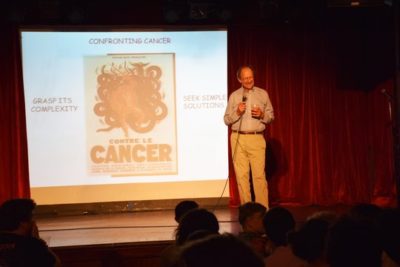
Harold Varmus at the 2016 Lasker Public Lecture in Honor of Al Sommer.
How does understanding the molecular mechanisms that cause cancerous growth contribute to ways in which cancers can be prevented, diagnosed, and treated? What are oncogenes and tumor suppressor genes, and how can mutations in these genes lead to unchecked cell growth? In what ways can public policy, government funding, and private citizens contribute to reducing the impact of cancer?
These and other questions were addressed by Harold Varmus, whose career in research science and public service has led him from a laboratory at University of California, San Francisco to the positions of director of the National Institutes of Health, the president of Memorial Sloan Kettering Cancer Center, and the director of the National Cancer Institute. Now at Weill Cornell Medcial College, Varmus is a recipient of the 1982 Albert Lasker Basic Medical Research Award.
The free public lecture was held on August 9 at the Bell House in Brooklyn and was co-hosted with the Secret Science Club. This special lecture was supported by an anonymous donation made in honor of the Lasker Foundation board member, Alfred (Al) Sommer, recipient of the 1997 Albert Lasker Clinical Medical Research Award and epidemiologist and Dean Emeritus at Johns Hopkins Bloomberg School of Public Health.
The Lasker annual public lectures are an exciting initiative that creates a direct dialogue between the public and some of the most accomplished scientists in the world. The August event attracted 400 attendees for an evening of informal learning and an opportunity to ask questions.
